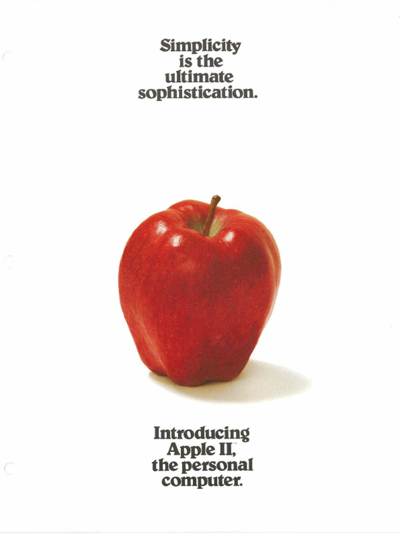Less, but better. This motto of the famous German designer Dieter Rams should guide us not only in the design of products, but also in the design of our collaboration. In the most cases working together in large organizations is over-regulated and the people in these organizations are over-protected. The resulting stability and security in honor, but individual initiative, creativity and top performance are stifled by this abundance of rules. According to Antoine de Saint-Exupéry, collaboration is only perfectly regulated when nothing can be omitted. A plea against the incapacitating and humiliating over-regulation of collaboration.
Perfection is achieved, not when there is nothing more to add, but when there is nothing left to take away.
Antoine de Saint-Exupéry
Simplicity is the ultimate sophistication. Apple used this slogan (later mistakenly attributed to Leonardo daVinci) to promote the Apple II in 1977. In terms of design and usability, Apple then (and since then repeatedly) set standards for personal computers and opened up a whole new market with this unique selling proposition.

Using Apple as an example, it is also easy to explain what is at stake if focus and simplicity are lost. After Steve Jobs left Apple in 1985 in a dispute with John Scully, Apple diversified its products and lost focus. The product portfolio became confusing and arbitrary, and over the years it became a life-threatening legacy for Apple.
That’s been one of my mantras — focus and simplicity. Simple can be harder than complex: You have to work hard to get your thinking clean to make it simple. But it’s worth it in the end because once you get there, you can move mountains.
Steve Jobs
Only a radical reduction of the product portfolio after the return of Steve Jobs in 1997 saved Apple from the almost certain bankruptcy: A four-field matrix with desktop and portable on one axis and consumer and professional on the other. He thus reduced Apple’s hopelessly exuberant portfolio by around 70% to manageable four product lines. Less but better.

Not all companies lose their focus as dramatically as Apple or at least not with such dramatic consequences, but basically the tendency to have overloaded products and overflowing product portfolios is recognizable in many places, although hopefully not as extreme as in this grandiose comic. Equally recognizable and perceptible is the tendency to over-regulate collaboration in a incapacitating and humiliating way through an excess of processes, guidelines and instructions.
Truth is ever to be found in simplicity, and not in the multiplicity and confusion of things.
Isaac Newton
There are always good reasons to add something new, a new function to a product as well as a new rule, a new instruction or a new process. Every special case, every abuse, every eventuality must then be considered and regulated. Where would we all end up?
Where would we end up?
Kurt Marti
When everyone said,
Where would we end up,
And no one would go,
To have a look,
Where you’d end up,
If you went.
Good question. We would leave the flood of concrete rules behind us and move towards a few basic principles of cooperation. Although they need common sense in their application and, after years of over-regulation, this common sense must of course first be sharpened again, but a brief look at the Netflix Culture Statement shows that it is possible in principle and leads to highly motivated employees. Expenses and contracts: “use good judgment”, travel expenses: “act in Netflix’s best interest”, holidays: “take vacation” or parental leave: “take care of your baby and yourself”.
The authors of the Manifesto for Agile Software Development also valued simplicity in form of one of their twelve principles, which is hardly surprising, as they objected to the over-regulation of software development by heavyweight process models with their Manifesto. And to avoid misunderstandings, they delivered a very useful definition at the same time: Simplicity is the art of maximizing the amount of work not done. In this sense and in the words of Anja Förster and Peter Kreuz: “Kill a stupid rule!” Many of them.





